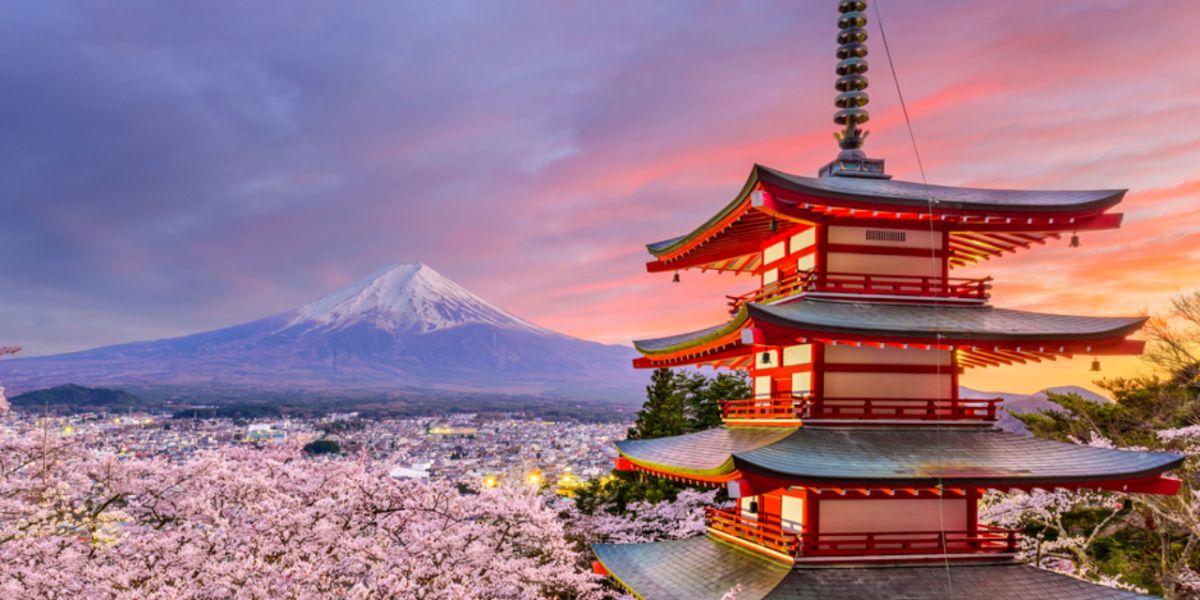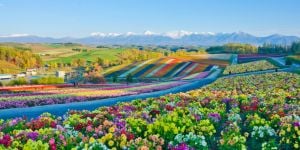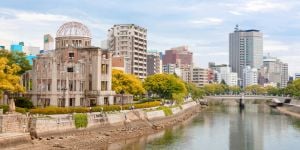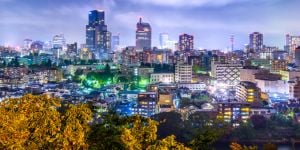
Traveling to Japan used to be impossible during the pandemic since the country blocked entry for all non-residents starting in December 2020. Although this restriction was eased gradually for students and workers in the years after, travelers and tourists still found it hard to enter the country. From April 29, 2023, since Japan lifted all border measures implemented to prevent the spread of COVID-19, the number of foreign visitors for business and leisure has significantly increased.

JNTO (the Japan National Tourism Organization) data recently showed that in October 2023, the number of visitors arriving in Japan reached 2.52 million. Surprisingly, this number surpassed pre-COVID levels, marking a complete recovery in arrivals for the first time since the relaxation of border controls in 2022.
Since January 1, 2024, Japan has no longer implemented measures to prevent the spread of the new coronavirus infection. This is great news for all foreigners who desire to visit the Land of the Rising Sun, both for short- or long-term stays.
Before packing up, you might wonder if Japanese tourism has changed after the pandemic. Will it be a dream-come-true trip or just a nightmare getaway? How can you best prepare for a once-in-a-lifetime experience?
Don't worry! Japan travel is now much more friendly to international visitors, especially looking forward to EXPO 2025. The Japanese government has embraced a positive attitude shift, making international travelers feel more welcome than ever before. For your convenience, we've rounded up ten crucial things you should know before traveling to Japan with newly updated information.
Visa information and requirements for a short-term stay in Japan
Types of short-term visas
Different types of short-term visas in Japan include business, transit, and tourist visas.
- Tourist visas are necessary for tourists visiting Japan, except for citizens of certain countries who are exempt from this requirement. The Japan tourist visa is for short-term stays for sightseeing, visiting relatives or friends, or attending conferences or courses. It is usually valid for a single-entry stay of up to 90 days.
It's worth mentioning that you cannot work for payment while you're in Japan on a tourist visa. If you want a job in Japan, consider applying for a long-term stay or a Japanese work visa.
- Business visas allow a stay of up to 90 days and can be single- or double-entry. They are used for conferences, meetings, contract signings, and market surveys.
- Transit visas are required for some nationalities when stopping in Japan on the way to another destination. However, you do not need this visa if you stay within the designated zone and do not leave the airport.
JAPAN eVISA
Introduced in August 2022 as part of the government's plan to reach 60 million foreign visitors a year by 2030, JAPAN eVISA is an online system allowing you to apply for and receive a single-entry electronic visa for short-term tourism (up to 90 days). JAPAN eVISA is only available for travelers entering Japan by plane.
Starting February 1st, 2023, residents from various countries and regions can apply for the JAPAN eVISA, including Australia, Brazil, Cambodia, Canada, Singapore, Taiwan, South Africa, the United Arab Emirates, Saudi Arabia, the United Kingdom, and the USA, except those exempt from a short-term visa.
You must pay some fees with a credit or debit card to apply. You will receive the eVisa approval notice via email once the application is submitted and approved.
Visa requirements in Japan
The documents required for both eVISA and in-person application may differ based on your country/region of residence and nationality/citizenship. In most cases, the following documents are necessary:
- Visa application form;
- Valid passport;
- Facial photo (passport type);
- Itinerary with flight information;
- Schedule of stay;
- Proof of the ability to pay for travel expenses (bank statement or income tax certificate);
- Proof of legal residency (driver's license, residence permit, or residence certificate);
- ID card issued by your government (both front and back sides if needed).
You can check the required documents on the JAPAN eVISA website or the website of the Embassy of Japan in your place.
Airport access in Japan
Your trip to Japan might involve a long-haul flight due to its remote location. However, accessing your hotel or stay will be a breeze once you arrive.
All international airports in Japan share some similarities. They are close to major cities, providing convenient access to local attractions with excellent transportation options, such as express trains, bus routes, taxis, and rental cars. Among these choices, the Japan Rail Pass and the local train network are excellent choices in terms of cost and time.
Moreover, these airports offer flights to numerous destinations worldwide. Certain smaller airports even provide international flights within Asia.
At Haneda and Narita airports in Tokyo, you can quickly obtain a prepaid SIM card or rent a pocket Wi-Fi device from the counters in all terminals' arrival areas between 7 am and 9 pm. Other airports like Kansai International Airport in Osaka or Chubu Centre International Airport in Nagoya offer free Wi-Fi access.
Accommodations for a short-term stay in Japan
You can find short-term accommodations in Japan ranging from affordable to luxury via well-known vacation rental sites like Airbnb, Vrbo, Tripadvisor, or Booking.com. Thanks to Japanese heritage, some unique accommodations might turn your time in Japan into a one-of-a-kind experience.
Temple stays
Staying at a temple (shukubo) is the perfect way to let go of your worries and experience a Japanese Zen moment of tranquility. Meals served at the temple are known as Shojin ryori, a type of Buddhist cuisine closely resembling a vegan dish that strictly avoids using meat, fish, dairy, or egg products.
You can easily book a shukubo online; plenty of English websites are available for your convenience, like the ones listed below:
- Waqoo Miidera (Shiga);
- Koyasan (Wakayama);
- Gyokuzoin (Nara);
- Ninnaji (Kyoto);
- Shourekiji (Kyoto);
- Enmeiin-SUWA (Nagano);
- Shougakuji (Saitama).
Castle stays
Japan's castles are rich in history, each with a captivating story. However, only two castles in the country provide the opportunity to visit, stay, and experience the past:
Japanese food and beverage
Japanese cuisine offers a variety of delicious options for food lovers. While sushi, wagyu beef, and kaiseki cuisine are well-known, you should not overlook street food like takoyaki, okonomiyaki, udon, and ramen.
Some must-try local cuisines you don't want to miss:
- Hokkaido: Genghis-Khan (lamb-based dish), Ishikarinabe (salmon and vegetable hotpot), Chanchanyaki (fired salmon with vegetable and miso sauce);
- Tohoku: Kiritanponabe (hotpot of stick-shaped baked rice simmering with chicken and vegetables in a dashi broth), Kaisendon (fresh sashimi served atop a steaming bowl of rice), Gyutan (beef tongue barbequed over hot coals);
- Kanto: traditional food in Tokyo like Fukagawadon or Monjayaki, Ankonabe in Ibaraki, Yakimanju in Gunma, Namero in Chiba, Houtou in Nagano;
- Kansai: miso-katsu in Nagoya, okonomiyaki and takoyaki in Osaka, Obanzai in Kyoto, Kobe beef from Hyogo and Matsusaka beef from Mie.
You might have heard the differences between Eastern and Western Japanese or Kanto and Kansai flavors. Indeed, each region and prefecture has its own specialties and culinary traditions influenced by its geographic characteristics, making your dining experience unique wherever you go.
Remember to try sake from a local brewery to complement your meal. Vegans and vegetarians will also find a variety of delicious food choices to enjoy.
Shopping in Japan
Japan offers various shopping options catering to all budgets and preferences, from department stores and outlet malls to bustling shopping streets. You'll find it all here whether you're looking for luxury designer brands or affordable bargains.
You can find various products in well-known department stores like Mitsukoshi, Matsuzakaya, Sogo, Takashimaya, Isetan, and Matsuya, from food to clothing to jewelry. Shopping centers are another great choice, with complexes located in major cities. These centers often feature hotels, theaters, luxury condos, and excellent shops.
For fashion enthusiasts, there are dedicated fashion buildings like 109 and Marui in Tokyo and E-ma and HEP FIVE in Osaka. If you want a more laid-back shopping experience, consider visiting one of Japan's outlet malls. With over 30 locations across the country, these malls are outside the busy city centers but still easily accessible by public transit.
For daily groceries or snacks, go to convenience stores or Konbini, like Family Mart, SevenEleven, or Lawson, which are open 24/7, all week.
The last but exciting one is vending machines. Japan has the most bizarre and fantastic vending machines that go beyond just selling cold drinks and snacks.
Nature and outdoors in Japan
Japan is truly a paradise for those who appreciate the beauty of the four seasons. The ever-changing landscapes during spring, summer, fall, and winter are awe-inspiring and profoundly impact the soul.
Did you know that besides the cherry blossom in spring, Japan has many other beautiful flowers that symbolize different seasons? These stunning flora can be found in parks throughout the country, creating breathtaking landscapes and providing fantastic photo opportunities.
In addition, considered one of the greenest destinations on Earth, Japan offers a variety of options for those who crave outdoor exploration, from diverse woodlands teeming with life to majestic snow-capped mountains, rushing rivers, and a stunning coastline stretching over 32,800 kilometers.
Whether you're up for a guided trek through untamed forests, an adrenaline-pumping canyoning adventure in wild rapids, a peaceful kayaking trip surrounded by serene nature, or a soul-soothing hike along sacred pilgrimage routes, Japan has it all. If you're feeling adventurous, why not try snorkeling in otherworldly surroundings or cycling through national parks? The possibilities are endless.
Activities in Japan
Embarking on an adventure in Japan means immersing yourself in a wide range of activities, all set against a backdrop of lush and diverse natural scenery adorned with vibrant seasonal hues. Whether cycling, hiking, diving, or participating in any sports activities and leisure activities in Japan, you'll have plenty of chances to pause and immerse yourself in the fascinating intricacies of Japan's rich culture:
- Hiking and trekking in Japan: Japan is a hiker's dream, with its mountainous landscape covering almost two-thirds of the country. From low-lying ranges to majestic peaks reaching high into the sky, there's a trail for everyone, regardless of their fitness level or hiking experience;
- Diving in Japan: Japan's top diving spots:
- The southern islands of Okinawa, including Miyako, Ishigaki, Iriomote, Yonaguni, and the Kerama Islands: from April to November,
- Northern latitudes of Japan, including Miyazaki, Kochi, the Izu Peninsula, and the Izu Islands: mainly during the summer months;
- Skiing in Japan: Japan is renowned for its exceptional skiing and snowboarding opportunities, consistently ranking among the top destinations worldwide. The country caters to everyone's needs with diverse ski resorts. Whether you're a beginner, an expert, a family with young children, or a couple seeking adventure and cultural experiences, Japan offers the perfect blend of thrilling skiing and boarding opportunities.
Getting around in Japan
When exploring Japan, most tourists rely on public transportation, such as trains, the Shinkansen (bullet train), and buses. Trains are incredibly convenient in Japan, no matter where you're headed. They are often the quickest mode of transportation.
In big cities, trains run every few minutes, but in rural areas, a bit more planning may be required as services can be more limited. One thing you can count on is that Japan's trains are always punctual, allowing you to plan your trips down to the minute.
Railroad companies and fares can vary depending on the city or region, especially in larger cities like Tokyo. You'll come across Japan Railways (JR), Tokyo Metro Lines, Toei Subway Lines, and more in Tokyo. In Osaka, there are options like JR, Hankyu Railway, Hanshin Electric Railway, and Keihan Railway, to name a few.
To find routes and calculate fares easily, you can use helpful apps like the JNTO app, Japan Travel by NAVITIME, Japan Transit Planner by Jorudan, or even Google Maps.
Save time during your travels in Japan by using a rechargeable transportation card. Different railway companies issue various cards, but most are accepted across additional services and cities. In the Kanto area, Suica and PASMO are commonly used IC Cards, while ICOCA and TOICA cards are popular in other regions.
However, it's important to note that the usage of IC cards may be limited to certain areas and modes of transportation. Look for the IC logo to see if your card can be used.
Emergencies in Japan
Although Japan is often considered one of the safest countries, you should remain cautious of potential dangers such as crimes, accidents, and especially natural disasters.
Indeed, extending along the Pacific Ring of Fire, the country is exposed to multiple hazards such as tsunamis, volcanic eruptions, earthquakes, and typhoons. Although most of these events are usually minor, it is crucial to be well-prepared in advance.
Here are some must-known emergency contact information you must remember:
- 119: in case of fire or traffic accident;
- 110: in case of a committed crime or traffic accident;
- Japan Visitor Hotline: 050-3816-2787.
Remember to check the safety tips for travelers from JNTO at the end of this article for more details.
Travel insurance
Japan boasts advanced medical services, but the associated treatments can be costly. Therefore, planning and securing travel insurance to mitigate potential financial burdens is prudent.
It's important to note that as from 2021, foreigners who have unpaid medical expenses in Japan may face restrictions or even be denied entry into the country.
Certain credit card companies provide travel insurance coverage. It would be beneficial to inquire with your card provider about the specifics of their insurance coverage before embarking on your journey.
Also, it's easy to purchase travel insurance through the Japan Tourism Agency's website, even if you're already in Japan. Check the JNTO website at the end of this article for further information.
Overall view of Japan
Japan is a dream destination for many reasons since nowhere else in the world offers a unique blend of ancient traditions and modern rituals quite like Japan. It's where centuries-old buildings stand tall alongside peaceful gardens and towering skyscrapers.
With its incredible gastronomy, Japan is a food lover's paradise, from fresh and delicious dishes to local drinks like sake. The people here are amiable and will make you feel right at home with their warm-hearted and thoughtful manners. Last but not least, Japan has an excellent public transportation system and is known for being one of the safest countries in the world.
So, don't wait any longer – start planning your trip to the Land of the Rising Sun for an experience you'll never forget!
Useful links
Exemption of short-term stay visa
We do our best to provide accurate and up to date information. However, if you have noticed any inaccuracies in this article, please let us know in the comments section below.








